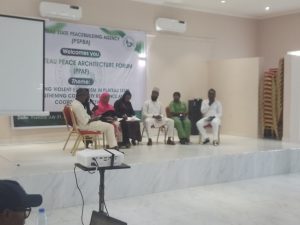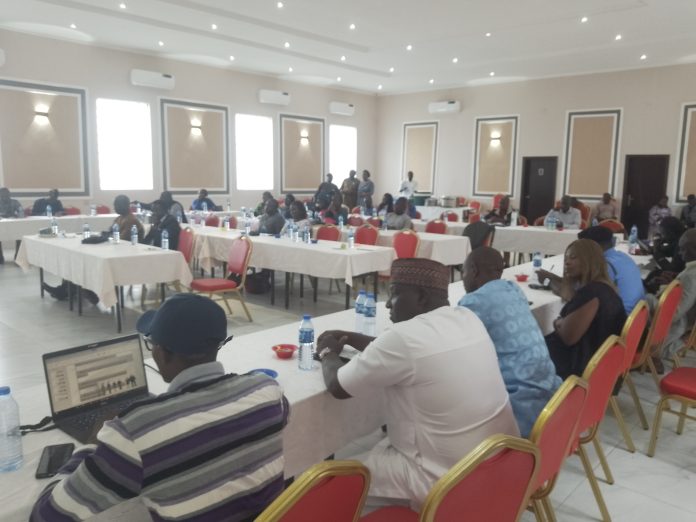In its continued effort to promote peace and counter violent extremism, the Plateau State Peace Building Agency (PPBA) on Thursday, July 31, 2025, convened the July edition of the Plateau Peace Architectural Forum at Fox Hotel, Jos. Themed “Preventing Violent Extremism in Plateau State: Strengthening Community Resilience and Coordinated Action,” the forum brought together peace activists, civil society organizations (CSOs), security agents, youth groups, and members of the Plateau State House of Assembly, among others.
The Director-General of PPBA, Dr. Julie G. Sanda, in her opening remarks, explained that the decision to focus on violent extremism was informed by recurring discussions from previous forums that revealed a shift in the nature of violence in the state.
“Last month, we began to notice a change in the dynamics of conflict on the Plateau. It wasn’t just communal clashes or religious tensions. We observed emerging patterns of banditry and ideological narratives that point to violent extremism,” Dr. Sanda said.
“We believe that peacebuilding is a multi-stakeholder process, and we need a shared understanding of these new realities if our responses are to be effective. Today’s conversation is about deepening that understanding and contextualizing Nigeria’s national plan on preventing violent extremism (PVE) for Plateau State,” she added.
Dr. Sanda also stressed the strategic inclusion of youth in the discussions, describing them as both potential victims and powerful agents for change.
“The focus on youth is deliberate. Often, they are labeled as perpetrators, but they also hold the power to lead positive transformation. We must provide them with platforms to be heard and to shape peace strategies,” she noted.
Delivering the keynote address, Mr. Boniface Anthony, Program Manager at the Justice Development and Peace Commission (JDPC), urged participants to rethink community responses to violent extremism.
“Violent extremism in Nigeria has evolved beyond global terrorist linkages to local drivers—land disputes, identity crises, marginalization, and political manipulation,” he said.
“Narratives that justify violence are often rooted in historical grievances and amplified by inequality, weak governance, and lack of accountability. We must dismantle these harmful stories by strengthening local peace structures,” he emphasized.
The event featured goodwill messages from various stakeholders. Nanmak D. Bali, President of the Plateau Peace Practitioners Network (PPPN), applauded PPBA for sustaining the monthly forum and called on stakeholders to take more decisive action.
“We’ve spent decades discussing the same issues. It’s time to ask ourselves: what can we do differently? We need innovation in peace practice,” he said.
Hon. Nandak Nisky, a member of the Plateau State House of Assembly, highlighted the need for communal trust and deeper relationships among stakeholders, stating that effective peacebuilding begins with knowing the people you work with.
Also speaking, Geraldine Ako of GIZ emphasized inclusive partnerships and encouraged participants to remain open to new ideas.
“No idea is too small. What we need is the willingness to implement those ideas and trust the process of collaboration,” she said.
The representative of PAVE Network, Judith Nendelmwa Remson, delivered a technical presentation on “Understanding the National Action Plan on Preventing Violent Extremism”, emphasizing that localization is key.
“We are plagued by identity-based tensions, weak institutions, and distrust. We can change this by localizing the national action plan through trust-building, youth engagement, rule of law, and community dialogue,” she said.
Another presentation was delivered by Peter Choji, Security Desk Officer, who discussed violent extremism in the context of Kanam Local Government Area. He clarified misleading reports about a recent incident in Kukawa, noting that the fatalities were not local vigilantes but rather militias who clashed with criminal elements.

A panel discussion followed, moderated by Avizavi Christopher of the PPBA, and featured young peace advocates and researchers such as Mubarak Usman Ibrahim, Nafisat Abdulazeez, Hope Chuwang, Zang Apollos, Shepherd Lander, and Panan Gongden.
The panel highlighted:
- Early signs of youth radicalization, including aggressive behavior, hatred narratives in schools, and declining parental guidance.
- Drivers of extremism, such as unresolved grievances, teacher influence, land grabbing, and social injustices.
- The role of youth in rebuilding trust, stressing forgiveness, community-based actions, and deliberate peace education.
- Gaps in existing peace efforts, with a call for practical implementation beyond repeated dialogue.
Participants were also grouped to brainstorm and propose localized solutions to counter violent extremism in their communities. Manji Mangrock of WANEP emphasized the importance of community justice systems and improving trust in institutions.
“When people lose trust in the justice system, they become vulnerable to manipulation. We must work to restore that trust if peace is to return,” he asserted.
Closing the event, PPBA’s Director of Programs, Nantip Joseph Laktam, reaffirmed the agency’s commitment to sustaining the conversation and translating discussions into tangible action.
“This forum is not an end but a step in a longer journey. Each edition builds on the last, and the next will continue the momentum. Our goal is to create practical solutions that respond to the unique challenges facing Plateau communities,” Laktam said.
The Plateau Peace Architectural Forum is a monthly dialogue platform designed to foster collaboration among diverse actors in the peacebuilding ecosystem, and this edition marked another milestone in advancing inclusive and proactive strategies for long-term stability in Plateau State.


